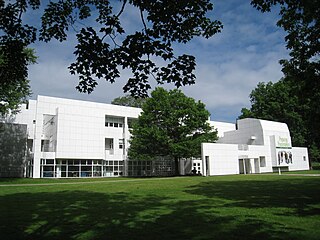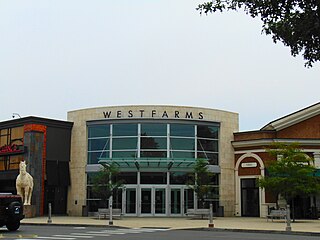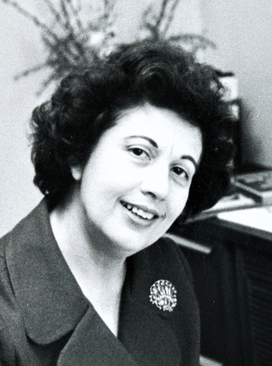
Hartford is the capital city of the U.S. state of Connecticut. The city, located in Hartford County, had a population of 121,054 as of the 2020 census. Hartford is the most populous city in the Capitol Planning Region and the core city of the Greater Hartford metropolitan area.

The University of Connecticut (UConn) is a public land-grant research university system with its main campus in Storrs, Connecticut. It was founded in 1881 as the Storrs Agricultural School, named after two benefactors. In 1893, the school became a public land grant college, taking the name University of Connecticut in 1939. Over the following decade, social work, nursing, and graduate programs were established. During the 1960s, UConn Health was established for new medical and dental schools. UConn is accredited by the New England Commission of Higher Education.

The University of Hartford (UHart) is a private university in West Hartford, Connecticut. Its 350-acre (1.4 km2) main campus extends into neighboring Hartford and Bloomfield. The university is accredited by the New England Commission of Higher Education.

Evelyn Beatrice Longman was a sculptor in the U.S. Her allegorical figure works were commissioned as monuments and memorials, adornment for public buildings, and attractions at art expositions in early 20th-century America. She was the first woman sculptor to be elected a full member of the National Academy of Design in 1919.

Chase Going Woodhouse was a prominent feminist leader, suffragist, and educator. She served as a member of the United States House of Representatives representing the Second Congressional District of Connecticut, becoming the second Congresswoman from Connecticut, the first elected as a Democrat, and the first woman born outside the United States in either chamber of the U.S. Congress.

The Bulkeley Bridge is the oldest of three highway bridges over the Connecticut River in Hartford, Connecticut. A stone arch bridge composed of nine spans, the bridge carries Interstate 84, U.S. Route 6, and U.S. Route 44 across the river, connecting Hartford to East Hartford. As of 2005 the bridge carried an average daily traffic of 142,500 cars. The arches are mounted on stone piers, and vary in length from 68 feet (21 m) to 119 feet (36 m); the total length of the bridge is 1,192 feet (363 m).

The Hartford International University for Religion and Peace is a private theological university in Hartford, Connecticut.

Capital Community College is a public community college in Hartford, Connecticut. The only public undergraduate institution in the City of Hartford, Capital's roots date to 1967 with the founding of Greater Hartford Community College. In 1992 Capital merged with Hartford State Technical College to become Capital Community-Technical College in a state-mandated consolidation. In 2000, the college's name was changed to Capital Community College.

G. Fox & Co. was a large department store that originated in Hartford, Connecticut. It was the largest privately held department store in the nation when it was sold in 1965 to the May Department Stores Company. In 1993, May Department stores phased out the G. Fox & Co. brand, converting them into the Boston-based department store Filene's. In 2005, the May Company merged with Federated Department Stores which converted the store and several other regional chains to Macy's.

Westfarms is a shopping mall on the West Hartford–Farmington town line in the U.S. state of Connecticut. It was opened in 1974, expanded in 1982 and 1995–1997, and remodeled in 2008–2009. With 1,267,000 square feet (117,700 m2) of gross leasable area, Westfarms is the third-largest mall in Connecticut. It is located on Route 71, off the I-84 and Route 9 junction and near several open-air shopping plazas. The mall is currently owned and managed by Taubman Centers, a subsidiary of Simon Property Group.
Mierle Laderman Ukeles is a New York City-based artist known for her feminist and service-oriented artworks, which relate the idea of process in conceptual art to domestic and civic "maintenance". She has been the Artist-in-Residence at the New York City Department of Sanitation. Her art brings to life the very essence of any urban center: waste flows, recycling, sustainability, environment, people, and ecology.

Downtown Hartford, Connecticut is the primary business district of the city, and the center of Connecticut's state government. Because of the large number of insurance companies headquartered there, Hartford is known as the "Insurance Capital of the World".

Antonina P. Uccello, was a second generation, Italian-American politician who was Mayor of Hartford, Connecticut, from 1967 to 1971.

Elizabeth Jarvis Colt was the widow and heir of firearms manufacturer Samuel Colt, founder of Colt's Manufacturing Company.
Elliot Francis Gerson is an American nonprofit executive, lawyer, business executive and state and federal government official. He is the executive vice president of The Aspen Institute, and the American Secretary of The Rhodes Trust.

Isabelle M. Kelley was an American social worker who was the primary architect of the Federal Food Stamp Program. When she was appointed to be the director of the Division which oversaw the Food Stamp Program for the US Department of Agriculture (USDA), she became the first woman to run a national social program or lead any Division of a federal agency. She has been inducted into the Connecticut Women's Hall of Fame and the USDA’s Hall of Heroes.

Ira Neimark was an American author, lecturer, and retail executive who served as Chairman and CEO of Bergdorf Goodman from 1975 to 1992. His reintroduction of French haute couture to New York with Yves Saint Laurent, Hubert de Givenchy, and Christian Dior sparked a period of growth for Bergdorf Goodman, which went from $18 million in sales in 1975 to $250 million in sales by 1992. During his tenure, he expanded the women's store and in 1991, he opened the Bergdorf Goodman Men's Store across the street from the primary location in New York.

Rachel Taylor Milton (1901–1995) was an American educator, community activist, and co-founder of the Urban League of Hartford, Connecticut. The first African American woman to graduate from Hartford Seminary, Milton was inducted into the Connecticut Women's Hall of Fame in 1994.

Zion Hill Cemetery is a city-owned cemetery that was established in the 1840s, which is located at Ward and Zion Streets in the Frog Hollow neighborhood of Hartford, Connecticut.

Eileen Shanley Kraus was an American business executive who broke the glass ceiling to be the first woman to run a major bank in Connecticut. She was inducted into the Connecticut Women's Hall of Fame in 2002.
















